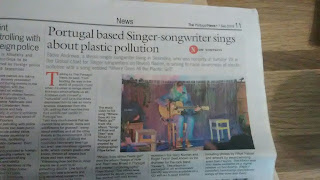Besides the Covid pandemic are we also the victims of a plastic pandemic?
It is worrying enough testing positive for Covid-19 and the pandemic has caused so much suffering and deaths around the world, but what if there is another form of pandemic that people do not know about? I am not talking about one that we can be vaccinated against. What if there is a plastic pandemic, not caused by a virus but by nano-plastics in the bloodstream? I was already well aware that micro-plastics and nano-plastics are being found everywhere, and I mean everywhere, so it didn’t surprise me that plastic has been found in human blood. We are consuming plastic in our food and drink and in the air we breathe. Most of this plastic we cannot see and are unaware of. The scale of this is unknown but it is happening increasingly, and now there are people who have tested positive for plastic. I was recently at the UN Ocean Conference in Lisbon, and there were two guest speakers there who are some of the first people in the world who have gone through the alarming experience of finding they test positive for plastic in their bloodstream. Jo Royle, founder of Common Seas was one of them and Ben Jack, programme director for Common Seas was the other. They know that they are living with plastic circulating in their bodies. Scientists testing for plastic have discovered that as many as 77% of those tested were found to have the material in their blood. It is unknown as to what effect plastic in our bloodstreams can cause. Will the material lodge in organs and tissues, will this cause harm, how will the body attempt to remove the plastic, are some of the questions that spring to mind. Do plastic particles in the blood lead to blood clots? Of course, the main problem is that plastic was made to last forever, it was made so it doesn’t decompose. What it does do is it breaks down into smaller and smaller pieces, and this is how nano-plastics are eventually formed. The planet has been contaminated by them. Dust fine plastic can be blown in the wind, carried in raindrops, end up on mountain tops and in the ice in polar regions. Plastic pollution is one of the most serious threats to life on this planet. Big pieces get swallowed by animals on land and at sea and can kill the unfortunate creatures, other animals die after getting trapped and entangled in plastic netting, but what harm micro and nano-plastics currently do, or in the long term, we cannot presently say. It is an international problem and we all need to take personal action in any way we can to help tackle the problem of plastic pollution. I took action by writing the song “Where Does All The Plastic Go?” and the book Saving Mother Ocean.
In my song I sing: “Plastic kills the turtles and is eaten by the fish, plastic is in the food chain and the dinner on your dish. Where does all the plastic go, into the sea, into the sea, how did it get there, who threw it away, was it you or was it me?”

































